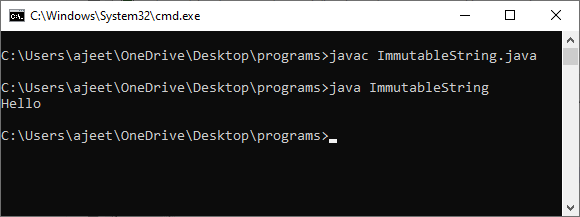Why Are Strings Immutable in Java? Vital Knowledge for Designers
Why Are Strings Immutable in Java? Vital Knowledge for Designers
Blog Article
Exploring the Advantages of Immutable Strings in Modern Programming Paradigms
In the world of modern-day programs standards, the idea of unalterable strings stands as a keystone of durable software development. The benefits they supply exceed simple convenience; they fundamentally change the means data is taken care of within applications. By adopting immutable strings, designers can make certain boosted information integrity, improved string safety, simplified debugging procedures, boosted security procedures, and reliable efficiency optimization. These advantages work as a testimony to the extensive influence that embracing immutability can have on the reliability and effectiveness of software program systems.
Boosted Data Honesty

By stopping the adjustment of string things, immutability eliminates the danger of unintended changes to the data they hold. This not only enhances the safety and security of the information yet likewise boosts the dependability of the code that depends on these strings.
Immutability additionally supports more secure multithreading settings, as simultaneous accessibility to unalterable strings does not posture the danger of data corruption via simultaneous modifications. This building streamlines the procedure of managing strings in parallel programs situations.
Basically, immutability functions as a protective guard around the data saved within strings, improving their integrity by guaranteeing that as soon as defined, their worths stay the same throughout the program's implementation.

Enhanced Thread Safety
Immutable strings improve the string security of programs by making sure that once a string things is produced, its value can not be changed. This building gets rid of the danger of concurrent strings attempting to change the very same string concurrently, which can lead to information corruption or irregular states in the program - Why are strings immutable in Java?. In a multi-threaded environment, where numerous threads gain access to and control data at the same time, the immutability of strings provides a degree of security by assuring that the data stays the same throughout its lifecycle
Streamlined Debugging Procedures
Provided the boosted string security assisted in by unalterable strings, a significant benefit emerges in the realm of simplified debugging procedures. Unalterable strings, when developed, can not be modified, making it simpler to map the circulation of data and determine the resource of bugs in a program. This immutability makes sure that strings stay regular throughout the execution of the program, minimizing the chance of unanticipated modifications that could bring about errors.
When debugging with mutable strings, developers often come across problems where a string's value is customized unintentionally, making it testing to pinpoint the source of a bug. Nevertheless, with unalterable strings, the information stays the same, permitting developers to concentrate on assessing the real logic of the code instead of finding where and when a string was modified incorrectly.
Furthermore, unalterable strings simplify the debugging procedure by allowing less complicated reproduction of insects. Since unalterable strings do not alter state, developers can recreate and research bugs better, causing quicker identification and resolution of problems within the codebase. This structured debugging workflow eventually adds to higher page software application high quality and boosted total advancement effectiveness.

Raised Security Steps
Enhancing information protection and fortifying system stability, the utilization of immutable strings in software applications adds substantially to enhanced safety steps. Immutable strings, once developed, can not be customized, offering an essential protection versus malicious meddling or unapproved access. By making certain that delicate information saved in strings remains unaltered throughout the program's execution, the risk of information breaches or shot strikes is greatly decreased. Why are strings immutable in Java?. Immutable strings additionally play a vital function in preventing typical security vulnerabilities such as barrier overflows and SQL shot strikes, as attempts to control string information at runtime are naturally restricted.
Furthermore, the immutability of strings boosts the predictability of program behavior, making it less complicated to verify inputs and avoid unforeseen modifications that might compromise security. This predictability simplifies the procedure of bookkeeping and validating code, making it possible for developers to recognize possible safety and security technicalities better. In general, including immutable strings right into software program growth practices not only boosts the toughness and dependability of applications however also strengthens their resilience versus protection risks.
Efficient Efficiency Optimization
When dealing with mutable strings, procedures like concatenation or substring production commonly result in the development of brand-new string items, leading to memory overhead and raised handling time. By permitting strings to remain stable and continuous, unalterable strings assist in far better memory administration and caching possibilities, ultimately enhancing the total effectiveness of the software application.
Immutable strings likewise play an essential role in multithreaded environments by advertising thread safety and security. Why are strings immutable in Java?. Since immutable strings can not be changed once produced, they can be shared throughout threads without the danger of unanticipated changes, lowering the requirement for synchronization systems and improving concurrency. Moreover, immutable strings simplify debugging processes as developers can trust that a string's value will remain consistent throughout the program's implementation, getting rid of prospective mistakes created by mutable state modifications. To conclude, making use of immutable strings not just boosts safety however likewise considerably adds to the reliable efficiency optimization of contemporary software program systems.
Final Thought
In final thought, the advantages of utilizing immutable strings in contemporary programming standards can not be overemphasized. Boosted data honesty, enhanced string security, simplified debugging processes, increased protection measures, and efficient efficiency optimization continue reading this all add to the general effectiveness of programs jobs. By including immutable strings right into programs techniques, designers can gain from a more robust and reputable codebase.
Immutability, a vital attribute of strings in programming languages such as Java and Python, guarantees that as soon as a string object is developed, it can not be modified or modified.Unalterable strings enhance the thread safety of programs by guaranteeing that once a string object is produced, its worth Get More Information can not be customized. Unalterable strings additionally play an essential duty in preventing typical safety susceptabilities such as buffer overflows and SQL shot strikes, as attempts to control string data at runtime are inherently restricted.
By allowing strings to stay unchangeable and constant, unalterable strings help with better memory management and caching opportunities, eventually increasing the total performance of the software.
Immutable strings simplify debugging processes as designers can rely on that a string's worth will certainly remain consistent throughout the program's implementation, eliminating prospective mistakes created by mutable state adjustments.
Report this page